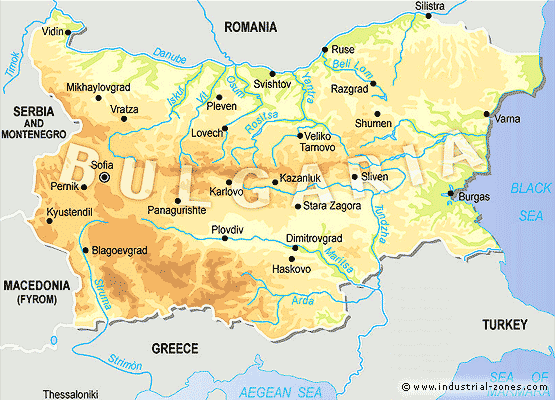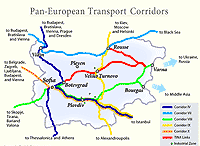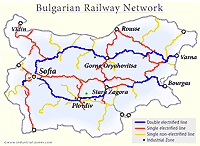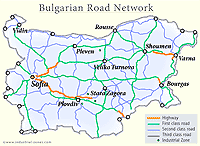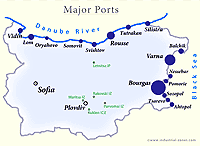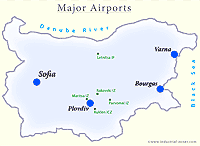 |
 |
 |
 |
 |
||
BULGARIA is located between Europe, the Middle East, Russia and Africa
POPULATION: 7.1 million
FOREIGN LANGUAGES: English, German, French, Russian, Spanish, Turkish
COLLEGE DEGREE: 15%
CURRENCY: 1 Euro = BGN 1.95583
S&P CREDIT RATING: BBB-/A-3
Location and Population
Bulgaria is located in the Southeastern part of the Balkan Peninsula. Bulgaria is 520 km. east to west and 330 km. north to south. It stands at a crossroads between Europe, and the emerging markets of the Middle East, Russia and Asia, sharing borders with Greece and Turkey to the South, Republic of North Macedonia to the Southwest and Serbia to the West. The Danube River is the Northern border with Romania and Black Sea is the country s Eastern border. Bulgaria ranks 15th in size among European countries where 7.1 mln. people live in a area of 111 000 km².
Within 500 km of Bulgaria s capital Sofia, over 60 mln. people are concentrated throughout 10 countries.
Bulgaria is divided into 28 districts and 263 municipalities within 6 regions of economic development.
Bulgarian largest cities: Sofia (pop. 1 300 000), Plovdiv (pop. 505 000), Varna (pop. 395 000) and Bourgas (pop. 313 000), Rousse (pop. 170 000)
Political Situation
Economy
http://www.mi.government.bg/en
Transport and Logistics
Transport Infrastructure
International highways cross the country making vital connections to Western Europe, Russia, Asia, Adriatic, the Aegean and Black Seas.
Legislation and Institutions
Bulgaria is a Parliamentary Republic and the Legislature is the basic power within the country. The Constitution provides for a multi-party, parliamentary system and free elections on the basis of universal suffrage. The National Assembly is vested with the legislative power and exercises parliamentary control. Its mandate is for a term of four years. The President serves as Head of State, and is directly elected once every five years for a maximum of two terms. The President is the Supreme Commander in Chief of the Armed Forces of the Republic of Bulgaria as well. The President appoints the Prime-Minister designate to form a government schedules the elections for a National Assembly and for the bodies of local self-government and sets the date for national referendums, pursuant to a resolution of the National Assembly promulgates the adopted laws with a decree countersigned by the Prime Minister or the minister concerned.
The Council of Ministers is the principal body of the Executive Branch. Chaired by the Prime Minister, it heads and implements the domestic and the foreign policy of the state, ensures the public order and the national security, exercises overall guidance over the state administration and the Armed Forces.
The municipality is the basic administrative territorial unit at the level of which self-government is exercised. The Municipal Councils, one of the local bodies of the executive branch, determine the policy of the municipality with regards to its development, the preservation of the environment, the health, social, educational, cultural activity, etc. The chief executive in the municipality is the Mayor. He manages the entire executive activity of the municipality, and is responsible for the public order maintenance, organizes the implementation of the municipality budget. The region is an administrative territorial unit where the state authority is decentralized for the purpose of pursuing an effective regional policy. The government of the region is performed by a regional governor, appointed by the Council of Ministers.
Bulgaria has an independent judiciary and based on Three-Instances-procedure. The Supreme Administrative Court and the Supreme Court of Cassation oversee the application of all laws by lower courts and judges the legality of government actions. A separate Constitutional Court rules on the constitutionality of laws and treaties. Judicial reforms are being implemented to bring Bulgaria s judiciary to European Union standards. The Supreme Judicial Council was established to organize the activities of the judiciary.
Investment Climate in Bulgaria
- Budget surplus, low inflation, currency peg to EUR
- 80% private economy
- EU accession in 2007, NATO member
- Investment grade rating BBB by S&P and Fitch
- Quality of human capital:
- Quality of business environment:
- Quality of life:
- Highly qualified workforce, especially in engineering field
- 10% corporate tax rate
- Tax exemptions and investment incentives for qualified investment
- Among lowest operational cost in a European market economy
- Duty free agreements covering markets with 550 million customers
- 58 Double Taxation Treaties and 56 Agreements on the mutual protection and promotion of foreign investment
Predictability
Quality
- Education levels among Europe top 5%
- 7% of workforce has engineering degrees
- English language studied by 70% of students
- Motivated and entrepreneurial attitude
- Strong institutional support for foreign investors by IBA
- No restrictions to capital flows
- Ample opportunities for all-season outdoor recreation
- Diverse cultural heritage and art activities
- World renown food and beverages
Competitiveness
Industrial Zones in Bulgaria
Industrial Zones development is an important factor for attracting new production enterprises. The Bulgarian state is stimulating Green field investments.
The Bulgarian state is trying to help attracting of new investors through a system of incentives formulated mainly in the Encouragement of Investment Act and Corporate Income Tax Law.
Up to the end of 2005 the following industrial zones are working or are in a process of creation in Bulgaria: Maritza Industrial and Commercial Zone (Radinovo village near by Plovdiv city), Rakovski Industrial Zone, Kuklen Industrial and Commercial Zone, Hi-Tech Industrial Park Opticoelectron – Panagiurishte city, as other industrial zones with different development stages like the zone in Rousse, Burgas, Bozhurishte and Elin Pelin (for more info see ‘Industrial Zones’).
One of the best successful examples for Public-Private Partnership is Rakovski Industrial Zone which is located near Plovdiv city. In accordance with expert’s opinion Rakovski Industrial Zone, which development has started in the middle of 2004 and it enjoys a great interest so far, has all premises to become in Zone №1 in Bulgaria.
Current supply of industrial property is mostly coming from privatized properties, which were constructed in the late forties and beginning of the fifties. The existing structures therefore are of little or no value. The supply of contemporary warehouse space is very limited. Most of the structures are stand alone or small-scale projects and are usually owner occupied. Rakovski Industrial Zone is the first green field development of such scale, which offers tailored to particular needs space for rent and sale. The tendency towards consolidation, i.e. development of large-scale projects, rather than stand-alone facilities is valid for the industrial real estate sector as well. Industrial parks are actually the oldest cluster developments dating back from the 17 hundreds. Industrial parks are located either at ports /sea or river/, close to airports if they rely mainly on air-freight, on railroad terminals and/or on main transportation corridors. It is crucial for an industrial development to be located on the crossroads of strategic locations next to major transportation arteries so that the supply and distribution is obstacle free. Due to the strategic location of Bulgaria, 5 out of the 10 Trans-European Corridors pass through the country. And 3 out of these five pass in close proximity to Rakovski Industrial Zone – the first industrial cluster in Bulgaria, facilitating the movement of goods all around Europe…
The experience of the Central and East Europe approve convincingly that the industrial zones are centers for foreign and local production enterprises development and bring to a catalytic effect for attracting investments and local economies development
Disposing of new manufactures in industrial zones in Bulgaria in the recent years seems to get a great interest from local and foreign investors. Reasons are pretty clear - such a union of productions, facilitates their own functioning, reduces the expenses, raises the competitive power and it has proved its world-wide effectiveness a long time ago. Besides that kind of unions involves certain incentives by the side of Bulgarian state. It is an unwritten rule that the investments are in a direct ratio to the good business climate, good technical infrastructure and the good quality of life.
Bulgaria enforces the European industrial politic principles in developing and implementing of the competitive power raising politics, for enterprise developing of the small and middle companies, encouraging the export business and the investments. The main purpose of the industrial politics is entire improvement of the business environment so the Bulgarian economic could resist the EU market forces competitive pressure.
Investment Incentives in Bulgaria
The incentives are available to companies registered in Bulgaria, regardless owner’s nationality.
10% corporate tax as of January 1, 2007
http://www.investbg.government.bg/en/pages/11-investment-incentives-184.html
Why Invest in Bulgaria
- Strategic geographic location
- Highly-skilled, multilingual workforce at Europe's most competitive wages
- Stable and predictable business and political environment
- EU membership on January 1, 2007 gives access to markets of over 560 million consumers
- The lowest operational costs and tax rates in a European market economy
- Industrial goods traded duty free between Bulgaria and the EU, EFTA, CEFTA and Turkey
- Excellent climate, natural scenery, food and hospitality
- Flat corporate income tax rate of 10%
- VAT exemption on equipment imports for investment projects over Eur 5 million
- Annual depreciation rate of 30% for machinery & equipment, 50% for new equipment used in entirely new investment or expansion and 50% for software and hardware
- Acquisition of land and property through Bulgarian registered company with 100% foreign ownership
- Administrative services through InvestBulgaria Agency
- 55 treaties for avoidance of double taxation
- 52 agreements on mutual protection and promotion of foreign investment
- NATO membership – March 2004
- Institutional support for major foreign investments projects
- Robust legal framework focused on attracting and protecting foreign investment
- Low regulatory obstacles and start-up costs
- Significant reduction in bureaucracy
- Adoption of International Accounting Standards (IAS)
- Bulgaria is among the leading investment destinations in Europe.
- In 2004, the country has attracted 7% of the total DFI in Central and East Europe and has positive perspectives for the future.
For more information:
https://www.plovdiv.bg/en/business/
For more information: TEZ.bg
Terms of Conditions of Site Use | Privacy Policy | web support

